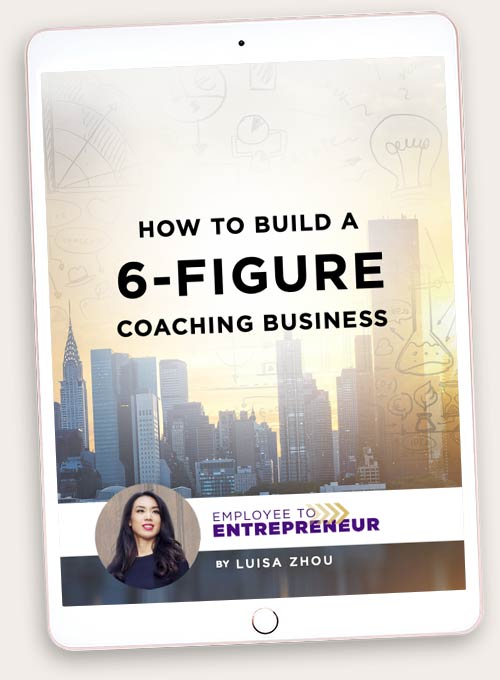Want to set business goals that are actually attainable?
You’ve come to the right place. Whether you’re a solopreneur or have a team, I’m going to help you clarify where you want to go – and HOW you can get there.
Let’s get started!
What are business goals?
Business goals are the target your business is aiming for. Setting the right goals is a skill all business leaders must learn.
You can have both short-term goals and long-term goals, but they should all point toward the final result you want.
For example, if your big long-term goal is to increase your sales revenue by 50% in the next five years, that won’t happen overnight.
BUT if you break down that goal into steps and follow a tested strategy in the short and long term, it’ll become way more doable. (And I’ll talk more about this later).

Want to Build a 6-Figure Coaching Business So You Can Achieve More Freedom?
Get Instant Access To My FREE Ultimate Guide Below!
When you sign up, you’ll also receive regular updates on building a successful online business.
What is the difference between goals and objectives?
Okay, maybe you’re heard the terms “goals” and “objectives” used interchangeably and you don’t know what the difference is.
Let me clear that up for you…
A goal is the outcome you’re aiming for, like hitting a particular sales threshold. So, it’s typically long-term and pretty broad.
Objectives, on the other hand, are typically shorter-term, and they’re more defined to help you attain your goal.
So, for example, if your long-term goal is attaining X in revenue, one of your shorter-term business objectives could be to hire a social media manager by the end of Q4.
See how having a smaller, short-term goal instantly feels less intimidating and doable compared to a huge end goal like 2x your revenue?
That’s why short-term company objectives are SO valuable. (And I’ll talk more about how to set effective goals in a bit).
Alright, let’s talk more about why setting goals is essential….
Why are business goals important?
Having built a multiple seven-figure business and helped 1,000+ people start their own businesses, I can’t overemphasize the importance of long-term goals in business.
Wondering why they’re so important exactly?
That’s what we’ll look at next.
Goals help you measure your growth
Okay, think about this…
What does business success look like to YOU? Maybe it means hitting a particular income threshold or being able to put your business on auto-pilot so you can work less.
Or, maybe it’s a mix of both (or something totally different).
The bottom line?
No matter what your vision is, having the right goals is how you’ll be able to measure your progress and determine if you need to make changes or not… WITHOUT getting completely overwhelmed by goals that are just way too big, too soon.
I talk more about measuring progress here:
Goals give clarity
Without goals, you or your team won’t know what you’re aiming for. And… if you don’t know what you’re aiming for, how can you know if you’re moving in the right direction?
And it’s not just having goals that’s important, it’s also putting them in writing.
Fun fact: Research shows that just by writing down your goals, you’ll be 43% more likely to achieve them.
And that’s true whether you work on your own or with a team. When you know what you want and HOW to get there, that’s how you get real results.
Speaking of which…
How do you set business goals?
Okay, let’s talk specifics: The HOW of setting business goals that are actually effective.
One common goal-setting method uses the acronym SMART, which stands for Specific, Measurable, Achievable, Relevant, and Time-Bound.
Now, I’m all for these goals, even if I don’t call my own goals “SMART” goals. I’ll explain below how to set goals with or without this acronym.
Alright, let’s get into some goal-setting strategies…
Set achievable goals
Achievable goals stand for one of the SMART goals.
The thing is, too often, I see people set their business goals in the wrong way. They’ll say something like:
“This quarter or this year, I’m going to hit my goal and grow my business to six figures.”
The problem?
First, yes — research shows that the best goals are specific, time-constrained and challenging goals. That’s when your performance improves 90% of the time.
But if your goal is TOO challenging, you won’t achieve it.
In the example above, a lot of people will fail because most of them have never built a business.
What this means is that most of them don’t know how to find clients, sell, or market their businesses.
And too often, the quarter or year ends… And nothing has happened.
They aren’t closer to 6-figures (or even 5-figures).
Now, I love big goals. I don’t think goals need to be “realistic.” (What does that even mean?)
But if you set goals for your business without a clue about how you’re going to reach them, they’re dreams, not goals.
With that said, some examples of business goals for the first year (assuming that you’ve never built a business) might be:
- Find a business idea.
- Get my first paying clients.
- Grow my business to a consistent monthly income.
On the other hand, it’s completely realistic for someone to come to me and say:
“I’ve made $10,000 in my business. I want to make six figures in the next four months.”
Why? Because they already know the basics. They have the fundamental pieces in place. Now it’s more about scaling that business plan.
When setting your goal, ask yourself:
Does your business goal feel scary, but you know how you’re going to achieve it?
If yes, you’re on the right track.
Reverse engineer your goals
Look, I used to be an engineer for the Space Station… Which means? I approach goals in a really methodical way.
So, here’s how you can do the same:
First, look at the end result you want in your business, and then work backward to figure out how to get there.
For example, if you’re a new business owner, one of your goals might be to “get one new client.”
Then, I’d look at the data to understand how I can reach that goal.
Think through…
- How many people do you need to reach to get that one sale?
- And based on that number, how many sales action items do you need to do every day? (AKA the action items that help you drive more sales, be it pitching clients or posting on social media.)
Now you can make a plan based on these numbers.
As you can see, working backwards can help you pinpoint exactly what you need to do to reach your ultimate goal.

Want to Build a 6-Figure Coaching Business So You Can Achieve More Freedom?
Get Instant Access To My FREE Ultimate Guide Below!
When you sign up, you’ll also receive regular updates on building a successful online business.
Believe in your goals
The key to hitting your goal is, in the end, to believe in them. And there’s a difference between trying to believe in your goal versus actually believing in it.
That’s because at the first setback, you’ll be tempted to tell yourself, “What was I thinking? This will never work!”
But here’s the thing…
You’ve achieved so many difficult things already. And maybe in the moment, you didn’t think you had it in you. But you did.
And it’s the same thing with business goals: You DO have what it takes.
So, instead of giving in to self-doubt, try this:
Surround yourself with reminders of your past successes. Write down things you’ve accomplished that you’re proud of.
And when you get discouraged, revisit this list as often as you need to.
Learn from the goals you don’t achieve
Look, you won’t always reach your goals.
But you know what? That’s part of the learning process.
What’s important is to look at WHY you didn’t hit your goals and adjust your business strategy accordingly.
So, imagine this: One of your goals was to have X in revenue by a particular date, but… you fell short.
In that case?
Re-examine what steps you took to get the results you DID get, and think about how you could do better next time.
For example, maybe you need to focus more on Marketing or targeted ads. And once you know what didn’t work, it’ll be easier to hit your target in the future.
Set long-term business goals
As I’ve already talked about, setting long-term business goals will help you zero in on what you’re ultimately aiming for.
I recommend setting yearly goals as long-term goals or even 5 or 10-year goals (which is what I do myself).
So, what are some good goals to set? No matter what your business is, here are some good ideas to get you started:
- Write down the company goals you want to reach in the next 5-10 years
- Focus on your main goals (instead of many simultaneously)
- Break them down into short-term objectives
- Track long-term results (and adjust your approach as needed)
Set short-term business goals
Alright, what about short-term goals? The first thing is to set them on a monthly basis.
With that, here’s the process:
- Pinpoint what goals you’d like to reach in the near future (approximately 1-3 months)
- Turn goals into actionable steps
- If you work with a team, assign tasks to each team member
- Track short-term results (and again, adjust your approach as needed)
What are good examples of business goals?
Okay, having a goal-setting process is great, but what if you need some concrete examples of what business goals can look like? I’ve got you covered.
Long-term goals
- Boost website SEO for better visibility in search engines
- Increase profits by 50%
- Build a 10-person team
Short-term goals
- Increase website traffic by 10% within three months
- Reach out to ten relevant blogs/podcasts per month to offer guest posting
- Improve customer satisfaction by 20%
Next steps
Alright, there you have it! Now you know how to set business goals that will get you results.
Ultimately, the key is to clarify where you’re heading and your plan to get there. And that’s where using a proven method comes in.
Need more help?
Get my free PDF that shows you how to build a 6-figure business (so you can FINALLY quit that 9-5 you’re not particularly passionate about).

Want to Build a 6-Figure Coaching Business So You Can Achieve More Freedom?
Get Instant Access To My FREE Ultimate Guide Below!
When you sign up, you’ll also receive regular updates on building a successful online business.
Read more:
Top Benefits of an Online Business
How to Learn to Sell Anything Online
How to Overcome Your Fear of Starting a Business









One Response
Having goals are great because they act as your destination markers so you know how you will move towards it.